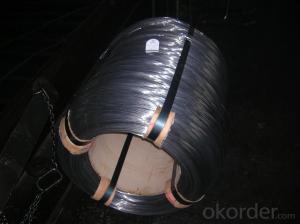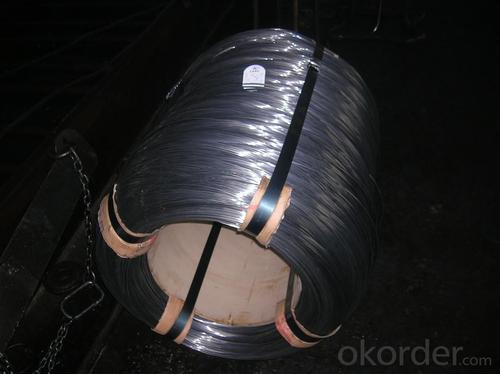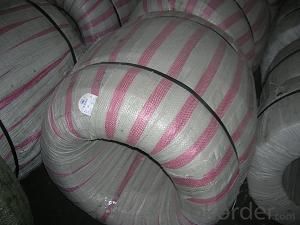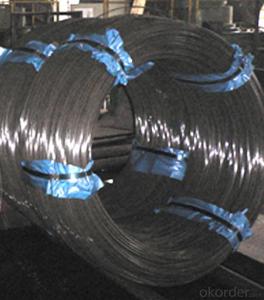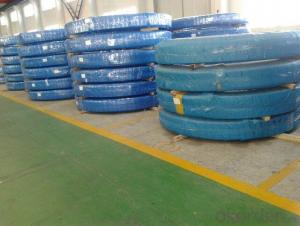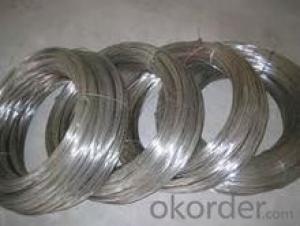COLD SPRING STEEL WIRE
- Loading Port:
- China Main Port
- Payment Terms:
- TT OR LC
- Min Order Qty:
- -
- Supply Capability:
- -
OKorder Service Pledge
OKorder Financial Service
You Might Also Like
Steel grade should be 82B,65Mn,70#,72B,45#,M10etc.diameter range from 0.4 to 2.0mm,package can following customer's required.currently mainly export to SAUDI ARABIA and INDIA.
we can satisfying market demands constantly and empoldering new product;can offering wires according to German standards(DIN17223/1,DIN17223/2),American standards(ASTM A227/A227M,ASTM A228/228M,ASTM 231/A231M,ASTM A401/401M),Japanese standards(JIS G3521,JIS G3522,JIS G3560,JIS G3561).and European standards(DIN EN10270-1,DIN10270-2)and so on.
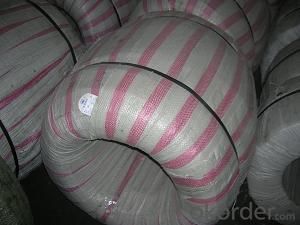
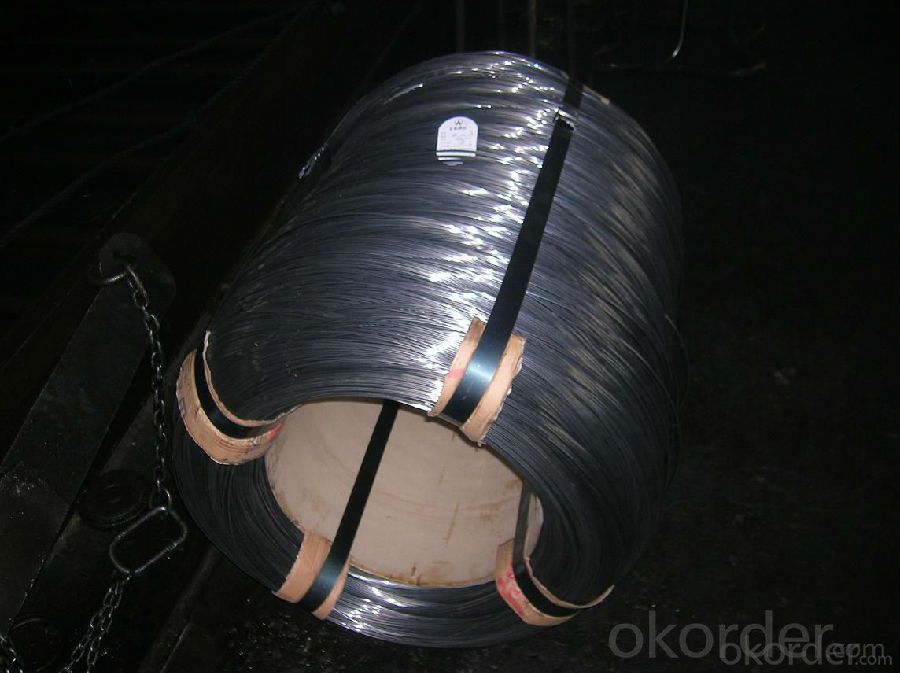
- Q: Can special steel be used in the production of gears?
- Yes, special steel can be used in the production of gears. Special steel, such as alloy steel or tool steel, is often preferred in gear manufacturing due to its high strength, wear resistance, and ability to withstand heavy loads and high temperatures. This steel type ensures gears have the necessary durability and performance required for various applications.
- Q: How does special steel contribute to the marine industry?
- Special steel plays a crucial role in the marine industry by offering exceptional strength, durability, and corrosion resistance, making it ideal for various marine applications. It is extensively used in the construction of ships, submarines, offshore platforms, and other marine structures, ensuring their structural integrity and safety. Additionally, special steel is used in manufacturing propellers and other critical components, enhancing efficiency and performance. Overall, special steel contributes significantly to the marine industry by providing reliable and high-quality materials that withstand harsh marine environments and support the growth and advancement of the sector.
- Q: How does special steel resist deformation under load?
- The unique composition and manufacturing techniques of special steel are specifically designed to prevent deformation under load. Its high strength is one of the key factors contributing to this resistance. Special steel is typically alloyed with elements like chromium, nickel, and molybdenum, which enhance its mechanical properties and make it stronger than regular steel. This increased strength allows the steel to bear heavier loads without significant deformation occurring. In addition, special steel often undergoes specialized heat treatment processes like quenching and tempering. These processes alter the steel's microstructure, resulting in a fine-grained structure and increased hardness. The fine-grained structure helps distribute the applied load more evenly, reducing the risk of localized deformation. Furthermore, special steel can exhibit exceptional toughness, meaning it can absorb a significant amount of energy before fracturing. Achieving this toughness involves carefully controlling the steel's chemical composition and manufacturing processes, such as controlling cooling rates during heat treatment. The ability to absorb energy without undergoing deformation further enhances its resistance to load-induced deformation. Moreover, special steel can possess superior fatigue resistance, allowing it to withstand repeated loading and unloading cycles without deformation. This is achieved by eliminating impurities and controlling the steel's grain structure, reducing the initiation and propagation of cracks that can lead to deformation. In conclusion, the combination of high strength, fine-grained structure, toughness, and fatigue resistance in special steel enables it to resist deformation under heavy loads. These characteristics are meticulously engineered and optimized during the manufacturing process to ensure that the steel can withstand intended applications and loads without significant deformation occurring.
- Q: How is special steel used in the medical supply chain?
- Special steel is used in various ways within the medical supply chain. It is commonly utilized in the production of surgical instruments, implants, and medical devices due to its exceptional properties such as strength, durability, and corrosion resistance. Special steel is crucial in ensuring the quality and safety of these medical supplies, as it can withstand the demanding conditions of surgical procedures and sterilization processes. Additionally, special steel is used in the manufacturing of storage and transportation equipment for medical supplies, ensuring their proper handling and preservation. Overall, special steel plays a vital role in maintaining the integrity and reliability of medical supplies throughout the entire supply chain.
- Q: What are the different methods for improving the corrosion resistance of stainless special steel?
- There are several methods for improving the corrosion resistance of stainless special steel. Some of the common methods include alloying the steel with elements such as chromium, nickel, and molybdenum, which enhance its resistance to corrosion. Another method is passivation, which involves treating the steel with an acid solution to remove any surface contaminants and create a protective oxide layer. Coating the steel with materials like paint, powder coating, or electroplating can also improve its corrosion resistance. Additionally, proper cleaning and maintenance practices, such as regular removal of dirt and debris, can help prevent corrosion and maintain the steel's resistance over time.
- Q: What are the different tempering techniques used for special steel?
- There are several tempering techniques used for special steel, including air tempering, oil tempering, water tempering, and salt bath tempering. Each technique involves heating the steel to a specific temperature and then cooling it at a controlled rate to achieve desired hardness, strength, and other mechanical properties.
- Q: What are the different welding methods used for special steel?
- There are several welding methods used for special steel, including Tungsten Inert Gas (TIG) welding, Metal Inert Gas (MIG) welding, Shielded Metal Arc Welding (SMAW), Flux-Cored Arc Welding (FCAW), and Submerged Arc Welding (SAW). These methods are chosen based on factors such as the type of steel, joint design, thickness, and desired welding quality.
- Q: Can special steel be used in the manufacturing industry?
- Yes, special steel can be commonly used in the manufacturing industry due to its unique properties and characteristics. Special steel alloys are often preferred for their high strength, durability, and resistance to corrosion, heat, and wear. These properties make special steel suitable for various applications in manufacturing, such as in the production of machinery, tools, automotive parts, aerospace components, and construction materials.
- Q: Can special steel be used in the agricultural industry?
- Yes, special steel can be used in the agricultural industry. It offers various benefits such as high strength, durability, corrosion resistance, and the ability to withstand harsh environmental conditions. It can be used for manufacturing agricultural machinery and equipment like tractors, plows, harvesters, and irrigation systems, improving efficiency and productivity in the agricultural sector.
- Q: How does mold steel resist wear and erosion?
- Mold steel resists wear and erosion due to its high hardness and toughness properties. It is specifically designed to withstand the abrasive forces and friction that occur during molding processes. Additionally, mold steel is often heat-treated to further enhance its resistance against wear and erosion, making it a durable and long-lasting material for mold manufacturing.
Send your message to us
COLD SPRING STEEL WIRE
- Loading Port:
- China Main Port
- Payment Terms:
- TT OR LC
- Min Order Qty:
- -
- Supply Capability:
- -
OKorder Service Pledge
OKorder Financial Service
Similar products
Hot products
Hot Searches
Related keywords
